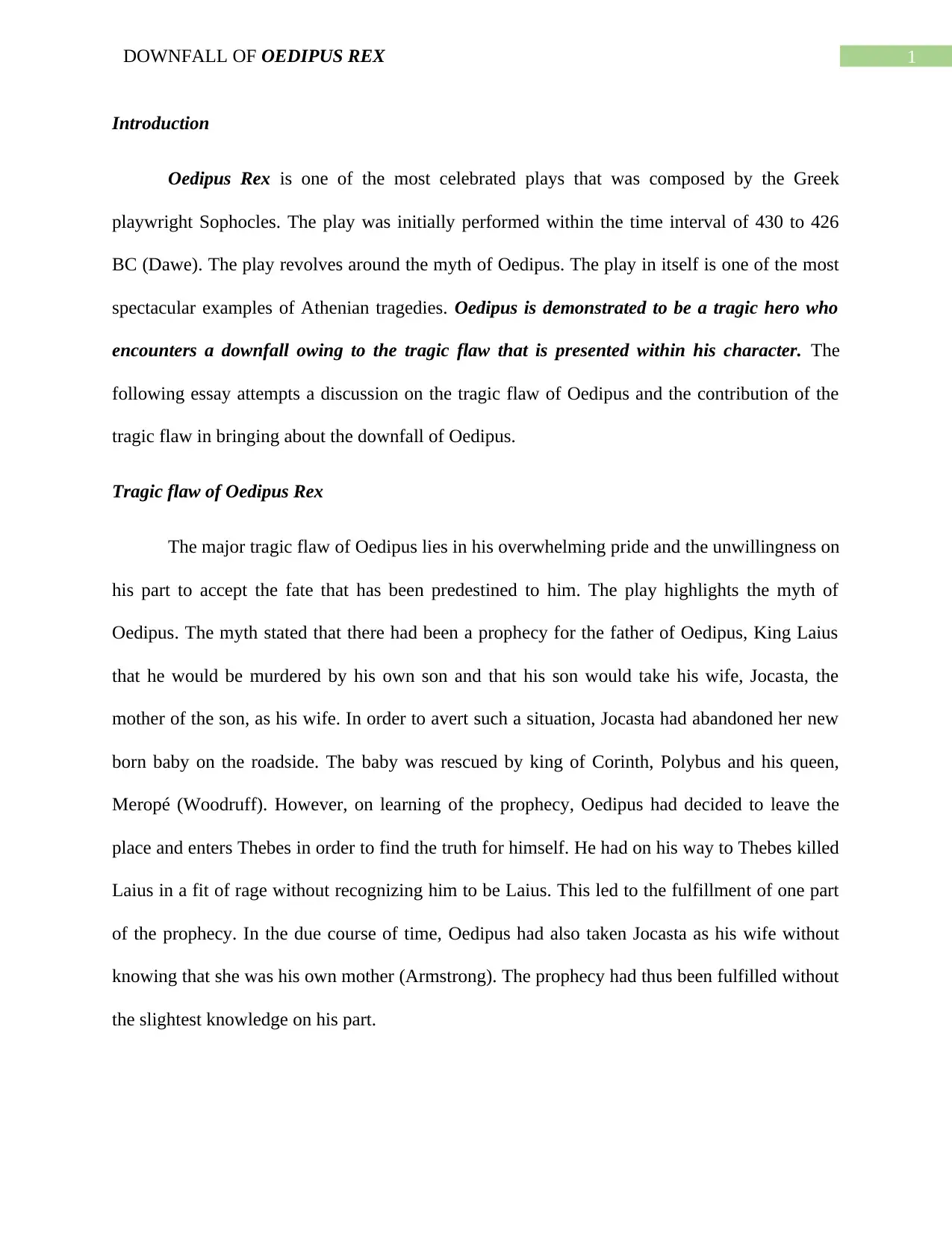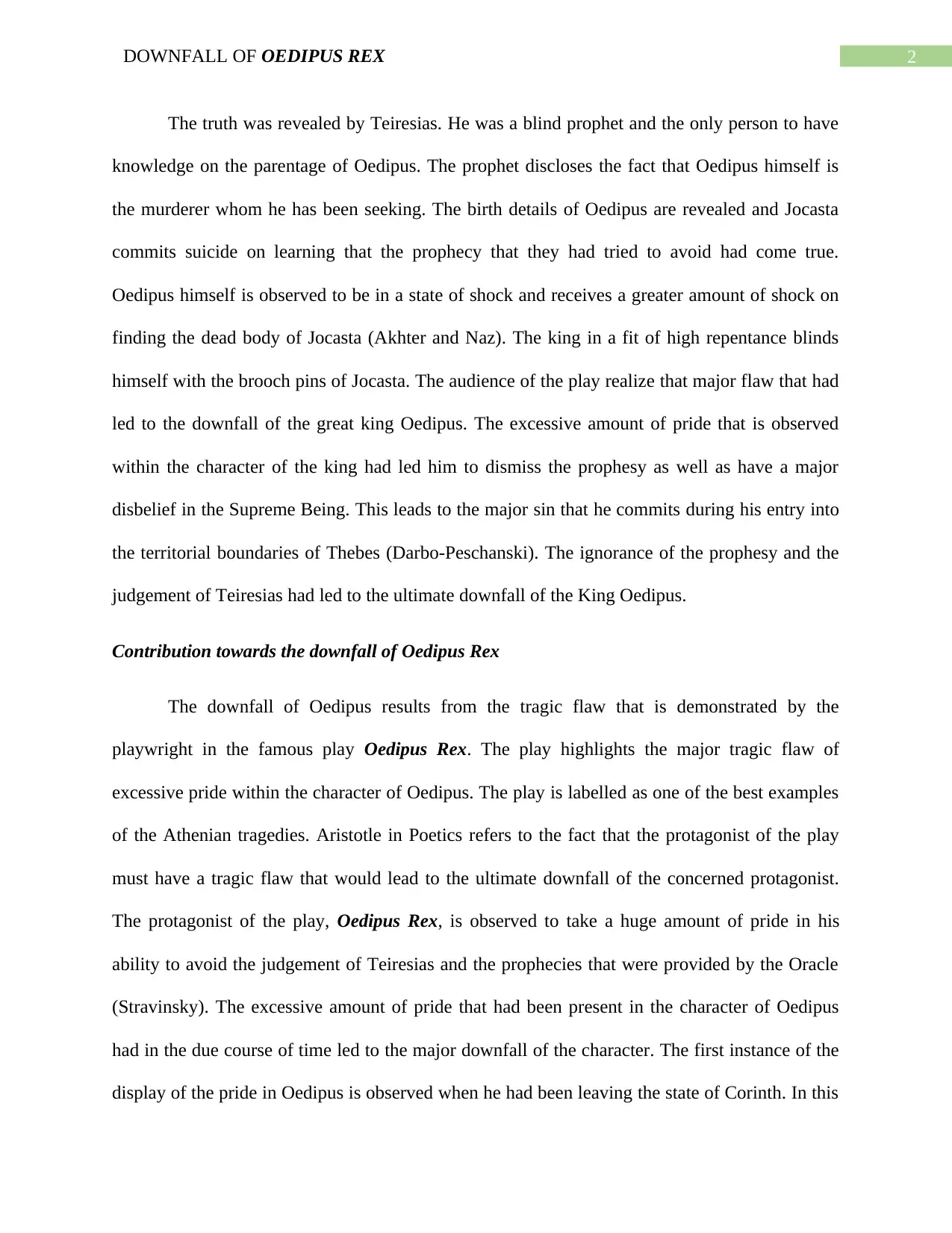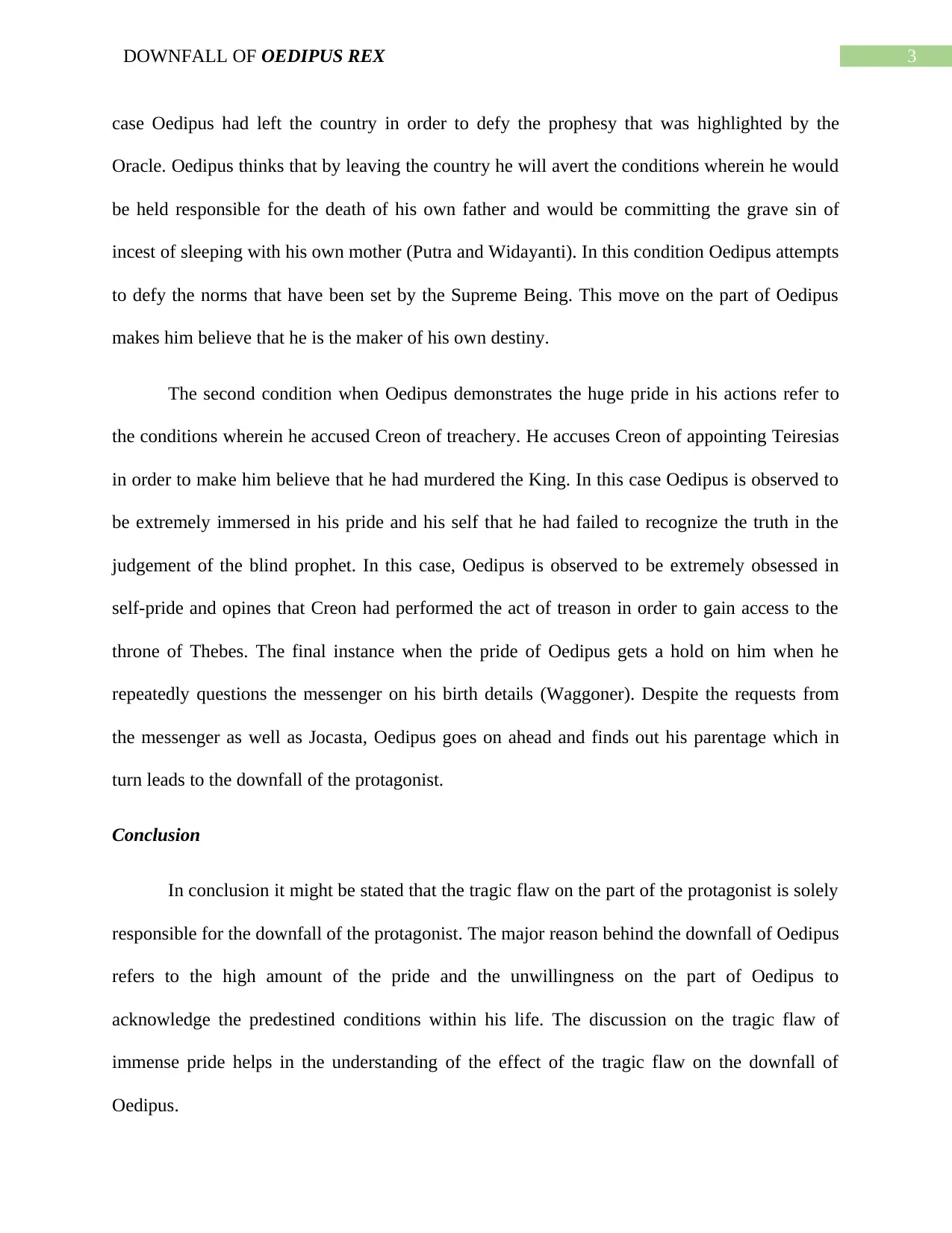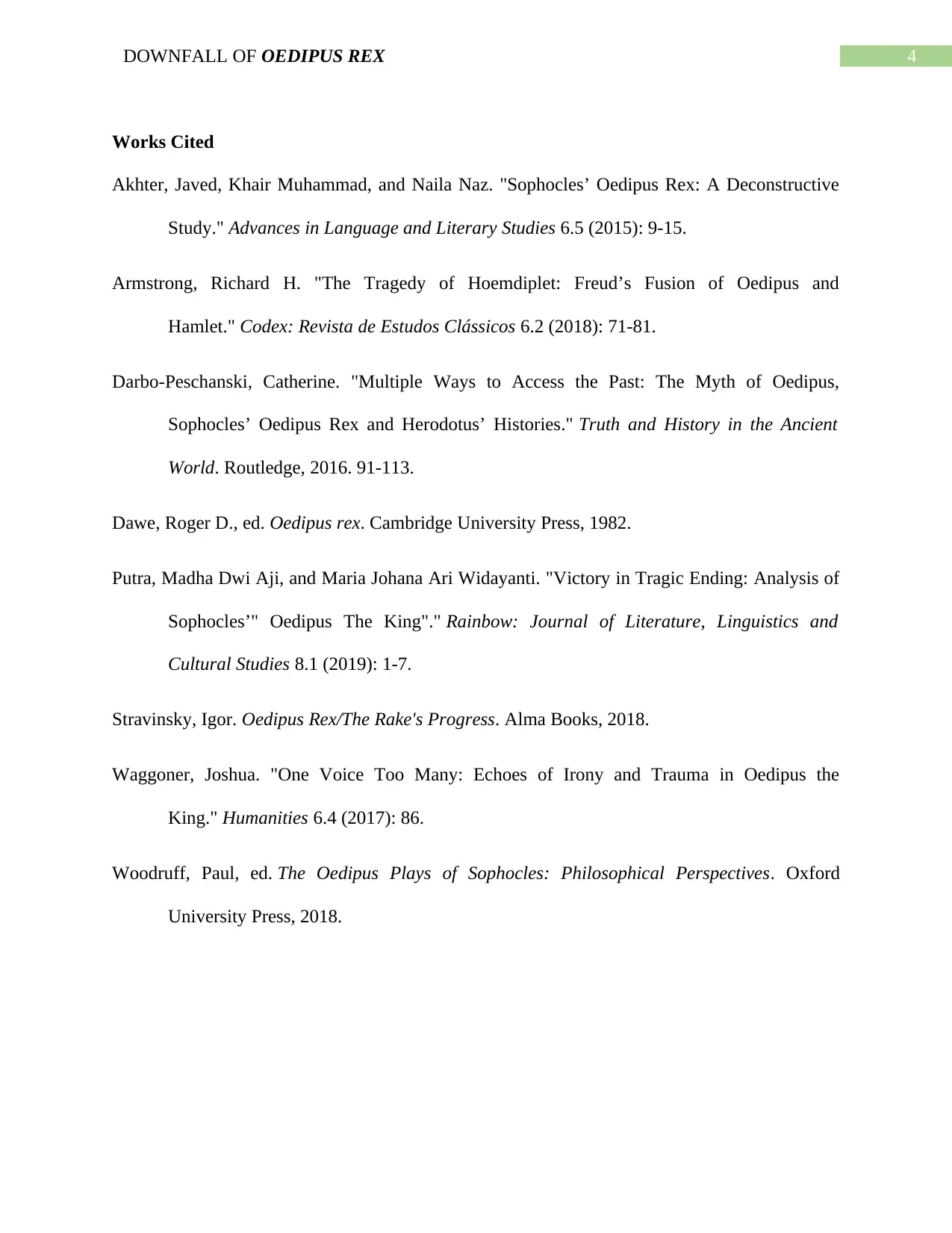Oedipus Rex: Exploring the Tragic Flaw and Its Consequences
VerifiedAdded on 2022/10/06
|5
|1361
|14
Essay
AI Summary
This essay provides an in-depth analysis of Sophocles' Oedipus Rex, focusing on the tragic flaw of pride and its pivotal role in Oedipus' downfall. The essay explores the myth of Oedipus, the prophecy concerning his fate, and how Oedipus' actions, driven by his overwhelming pride and unwillingness to accept his predetermined destiny, lead to the fulfillment of the prophecy and his ultimate ruin. The discussion delves into key instances where Oedipus' pride manifests, such as his departure from Corinth, his accusations against Creon, and his persistent questioning of the messenger regarding his parentage. The essay references Aristotle's concept of the tragic flaw, highlighting how Oedipus' excessive pride and disbelief in the divine contribute to his tragic fate. The conclusion emphasizes that the protagonist's tragic flaw is the primary cause of his downfall. The essay references the works of various scholars to support its analysis.

Running head: DOWNFALL OF OEDIPUS REX
DOWNFALL OF OEDIPUS REX
Name of the Student
Name of the University
Author Note
DOWNFALL OF OEDIPUS REX
Name of the Student
Name of the University
Author Note
Paraphrase This Document
Need a fresh take? Get an instant paraphrase of this document with our AI Paraphraser

1DOWNFALL OF OEDIPUS REX
Introduction
Oedipus Rex is one of the most celebrated plays that was composed by the Greek
playwright Sophocles. The play was initially performed within the time interval of 430 to 426
BC (Dawe). The play revolves around the myth of Oedipus. The play in itself is one of the most
spectacular examples of Athenian tragedies. Oedipus is demonstrated to be a tragic hero who
encounters a downfall owing to the tragic flaw that is presented within his character. The
following essay attempts a discussion on the tragic flaw of Oedipus and the contribution of the
tragic flaw in bringing about the downfall of Oedipus.
Tragic flaw of Oedipus Rex
The major tragic flaw of Oedipus lies in his overwhelming pride and the unwillingness on
his part to accept the fate that has been predestined to him. The play highlights the myth of
Oedipus. The myth stated that there had been a prophecy for the father of Oedipus, King Laius
that he would be murdered by his own son and that his son would take his wife, Jocasta, the
mother of the son, as his wife. In order to avert such a situation, Jocasta had abandoned her new
born baby on the roadside. The baby was rescued by king of Corinth, Polybus and his queen,
Meropé (Woodruff). However, on learning of the prophecy, Oedipus had decided to leave the
place and enters Thebes in order to find the truth for himself. He had on his way to Thebes killed
Laius in a fit of rage without recognizing him to be Laius. This led to the fulfillment of one part
of the prophecy. In the due course of time, Oedipus had also taken Jocasta as his wife without
knowing that she was his own mother (Armstrong). The prophecy had thus been fulfilled without
the slightest knowledge on his part.
Introduction
Oedipus Rex is one of the most celebrated plays that was composed by the Greek
playwright Sophocles. The play was initially performed within the time interval of 430 to 426
BC (Dawe). The play revolves around the myth of Oedipus. The play in itself is one of the most
spectacular examples of Athenian tragedies. Oedipus is demonstrated to be a tragic hero who
encounters a downfall owing to the tragic flaw that is presented within his character. The
following essay attempts a discussion on the tragic flaw of Oedipus and the contribution of the
tragic flaw in bringing about the downfall of Oedipus.
Tragic flaw of Oedipus Rex
The major tragic flaw of Oedipus lies in his overwhelming pride and the unwillingness on
his part to accept the fate that has been predestined to him. The play highlights the myth of
Oedipus. The myth stated that there had been a prophecy for the father of Oedipus, King Laius
that he would be murdered by his own son and that his son would take his wife, Jocasta, the
mother of the son, as his wife. In order to avert such a situation, Jocasta had abandoned her new
born baby on the roadside. The baby was rescued by king of Corinth, Polybus and his queen,
Meropé (Woodruff). However, on learning of the prophecy, Oedipus had decided to leave the
place and enters Thebes in order to find the truth for himself. He had on his way to Thebes killed
Laius in a fit of rage without recognizing him to be Laius. This led to the fulfillment of one part
of the prophecy. In the due course of time, Oedipus had also taken Jocasta as his wife without
knowing that she was his own mother (Armstrong). The prophecy had thus been fulfilled without
the slightest knowledge on his part.

2DOWNFALL OF OEDIPUS REX
The truth was revealed by Teiresias. He was a blind prophet and the only person to have
knowledge on the parentage of Oedipus. The prophet discloses the fact that Oedipus himself is
the murderer whom he has been seeking. The birth details of Oedipus are revealed and Jocasta
commits suicide on learning that the prophecy that they had tried to avoid had come true.
Oedipus himself is observed to be in a state of shock and receives a greater amount of shock on
finding the dead body of Jocasta (Akhter and Naz). The king in a fit of high repentance blinds
himself with the brooch pins of Jocasta. The audience of the play realize that major flaw that had
led to the downfall of the great king Oedipus. The excessive amount of pride that is observed
within the character of the king had led him to dismiss the prophesy as well as have a major
disbelief in the Supreme Being. This leads to the major sin that he commits during his entry into
the territorial boundaries of Thebes (Darbo-Peschanski). The ignorance of the prophesy and the
judgement of Teiresias had led to the ultimate downfall of the King Oedipus.
Contribution towards the downfall of Oedipus Rex
The downfall of Oedipus results from the tragic flaw that is demonstrated by the
playwright in the famous play Oedipus Rex. The play highlights the major tragic flaw of
excessive pride within the character of Oedipus. The play is labelled as one of the best examples
of the Athenian tragedies. Aristotle in Poetics refers to the fact that the protagonist of the play
must have a tragic flaw that would lead to the ultimate downfall of the concerned protagonist.
The protagonist of the play, Oedipus Rex, is observed to take a huge amount of pride in his
ability to avoid the judgement of Teiresias and the prophecies that were provided by the Oracle
(Stravinsky). The excessive amount of pride that had been present in the character of Oedipus
had in the due course of time led to the major downfall of the character. The first instance of the
display of the pride in Oedipus is observed when he had been leaving the state of Corinth. In this
The truth was revealed by Teiresias. He was a blind prophet and the only person to have
knowledge on the parentage of Oedipus. The prophet discloses the fact that Oedipus himself is
the murderer whom he has been seeking. The birth details of Oedipus are revealed and Jocasta
commits suicide on learning that the prophecy that they had tried to avoid had come true.
Oedipus himself is observed to be in a state of shock and receives a greater amount of shock on
finding the dead body of Jocasta (Akhter and Naz). The king in a fit of high repentance blinds
himself with the brooch pins of Jocasta. The audience of the play realize that major flaw that had
led to the downfall of the great king Oedipus. The excessive amount of pride that is observed
within the character of the king had led him to dismiss the prophesy as well as have a major
disbelief in the Supreme Being. This leads to the major sin that he commits during his entry into
the territorial boundaries of Thebes (Darbo-Peschanski). The ignorance of the prophesy and the
judgement of Teiresias had led to the ultimate downfall of the King Oedipus.
Contribution towards the downfall of Oedipus Rex
The downfall of Oedipus results from the tragic flaw that is demonstrated by the
playwright in the famous play Oedipus Rex. The play highlights the major tragic flaw of
excessive pride within the character of Oedipus. The play is labelled as one of the best examples
of the Athenian tragedies. Aristotle in Poetics refers to the fact that the protagonist of the play
must have a tragic flaw that would lead to the ultimate downfall of the concerned protagonist.
The protagonist of the play, Oedipus Rex, is observed to take a huge amount of pride in his
ability to avoid the judgement of Teiresias and the prophecies that were provided by the Oracle
(Stravinsky). The excessive amount of pride that had been present in the character of Oedipus
had in the due course of time led to the major downfall of the character. The first instance of the
display of the pride in Oedipus is observed when he had been leaving the state of Corinth. In this
⊘ This is a preview!⊘
Do you want full access?
Subscribe today to unlock all pages.

Trusted by 1+ million students worldwide

3DOWNFALL OF OEDIPUS REX
case Oedipus had left the country in order to defy the prophesy that was highlighted by the
Oracle. Oedipus thinks that by leaving the country he will avert the conditions wherein he would
be held responsible for the death of his own father and would be committing the grave sin of
incest of sleeping with his own mother (Putra and Widayanti). In this condition Oedipus attempts
to defy the norms that have been set by the Supreme Being. This move on the part of Oedipus
makes him believe that he is the maker of his own destiny.
The second condition when Oedipus demonstrates the huge pride in his actions refer to
the conditions wherein he accused Creon of treachery. He accuses Creon of appointing Teiresias
in order to make him believe that he had murdered the King. In this case Oedipus is observed to
be extremely immersed in his pride and his self that he had failed to recognize the truth in the
judgement of the blind prophet. In this case, Oedipus is observed to be extremely obsessed in
self-pride and opines that Creon had performed the act of treason in order to gain access to the
throne of Thebes. The final instance when the pride of Oedipus gets a hold on him when he
repeatedly questions the messenger on his birth details (Waggoner). Despite the requests from
the messenger as well as Jocasta, Oedipus goes on ahead and finds out his parentage which in
turn leads to the downfall of the protagonist.
Conclusion
In conclusion it might be stated that the tragic flaw on the part of the protagonist is solely
responsible for the downfall of the protagonist. The major reason behind the downfall of Oedipus
refers to the high amount of the pride and the unwillingness on the part of Oedipus to
acknowledge the predestined conditions within his life. The discussion on the tragic flaw of
immense pride helps in the understanding of the effect of the tragic flaw on the downfall of
Oedipus.
case Oedipus had left the country in order to defy the prophesy that was highlighted by the
Oracle. Oedipus thinks that by leaving the country he will avert the conditions wherein he would
be held responsible for the death of his own father and would be committing the grave sin of
incest of sleeping with his own mother (Putra and Widayanti). In this condition Oedipus attempts
to defy the norms that have been set by the Supreme Being. This move on the part of Oedipus
makes him believe that he is the maker of his own destiny.
The second condition when Oedipus demonstrates the huge pride in his actions refer to
the conditions wherein he accused Creon of treachery. He accuses Creon of appointing Teiresias
in order to make him believe that he had murdered the King. In this case Oedipus is observed to
be extremely immersed in his pride and his self that he had failed to recognize the truth in the
judgement of the blind prophet. In this case, Oedipus is observed to be extremely obsessed in
self-pride and opines that Creon had performed the act of treason in order to gain access to the
throne of Thebes. The final instance when the pride of Oedipus gets a hold on him when he
repeatedly questions the messenger on his birth details (Waggoner). Despite the requests from
the messenger as well as Jocasta, Oedipus goes on ahead and finds out his parentage which in
turn leads to the downfall of the protagonist.
Conclusion
In conclusion it might be stated that the tragic flaw on the part of the protagonist is solely
responsible for the downfall of the protagonist. The major reason behind the downfall of Oedipus
refers to the high amount of the pride and the unwillingness on the part of Oedipus to
acknowledge the predestined conditions within his life. The discussion on the tragic flaw of
immense pride helps in the understanding of the effect of the tragic flaw on the downfall of
Oedipus.
Paraphrase This Document
Need a fresh take? Get an instant paraphrase of this document with our AI Paraphraser

4DOWNFALL OF OEDIPUS REX
Works Cited
Akhter, Javed, Khair Muhammad, and Naila Naz. "Sophocles’ Oedipus Rex: A Deconstructive
Study." Advances in Language and Literary Studies 6.5 (2015): 9-15.
Armstrong, Richard H. "The Tragedy of Hoemdiplet: Freud’s Fusion of Oedipus and
Hamlet." Codex: Revista de Estudos Clássicos 6.2 (2018): 71-81.
Darbo-Peschanski, Catherine. "Multiple Ways to Access the Past: The Myth of Oedipus,
Sophocles’ Oedipus Rex and Herodotus’ Histories." Truth and History in the Ancient
World. Routledge, 2016. 91-113.
Dawe, Roger D., ed. Oedipus rex. Cambridge University Press, 1982.
Putra, Madha Dwi Aji, and Maria Johana Ari Widayanti. "Victory in Tragic Ending: Analysis of
Sophocles’" Oedipus The King"." Rainbow: Journal of Literature, Linguistics and
Cultural Studies 8.1 (2019): 1-7.
Stravinsky, Igor. Oedipus Rex/The Rake's Progress. Alma Books, 2018.
Waggoner, Joshua. "One Voice Too Many: Echoes of Irony and Trauma in Oedipus the
King." Humanities 6.4 (2017): 86.
Woodruff, Paul, ed. The Oedipus Plays of Sophocles: Philosophical Perspectives. Oxford
University Press, 2018.
Works Cited
Akhter, Javed, Khair Muhammad, and Naila Naz. "Sophocles’ Oedipus Rex: A Deconstructive
Study." Advances in Language and Literary Studies 6.5 (2015): 9-15.
Armstrong, Richard H. "The Tragedy of Hoemdiplet: Freud’s Fusion of Oedipus and
Hamlet." Codex: Revista de Estudos Clássicos 6.2 (2018): 71-81.
Darbo-Peschanski, Catherine. "Multiple Ways to Access the Past: The Myth of Oedipus,
Sophocles’ Oedipus Rex and Herodotus’ Histories." Truth and History in the Ancient
World. Routledge, 2016. 91-113.
Dawe, Roger D., ed. Oedipus rex. Cambridge University Press, 1982.
Putra, Madha Dwi Aji, and Maria Johana Ari Widayanti. "Victory in Tragic Ending: Analysis of
Sophocles’" Oedipus The King"." Rainbow: Journal of Literature, Linguistics and
Cultural Studies 8.1 (2019): 1-7.
Stravinsky, Igor. Oedipus Rex/The Rake's Progress. Alma Books, 2018.
Waggoner, Joshua. "One Voice Too Many: Echoes of Irony and Trauma in Oedipus the
King." Humanities 6.4 (2017): 86.
Woodruff, Paul, ed. The Oedipus Plays of Sophocles: Philosophical Perspectives. Oxford
University Press, 2018.
1 out of 5
Related Documents
Your All-in-One AI-Powered Toolkit for Academic Success.
+13062052269
info@desklib.com
Available 24*7 on WhatsApp / Email
![[object Object]](/_next/static/media/star-bottom.7253800d.svg)
Unlock your academic potential
Copyright © 2020–2025 A2Z Services. All Rights Reserved. Developed and managed by ZUCOL.





